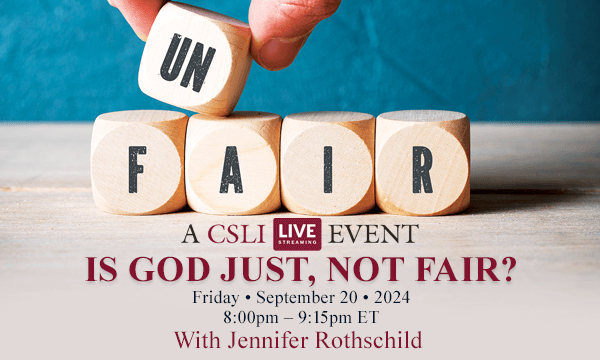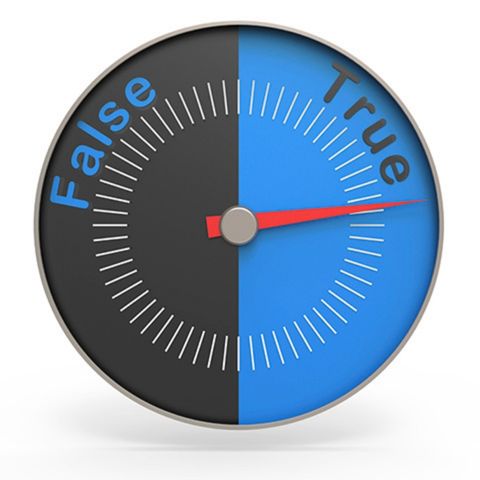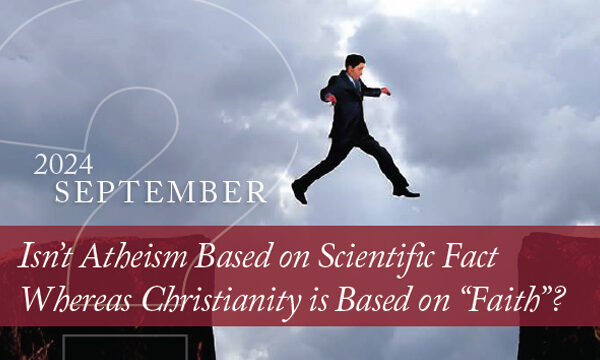Back to series

October 2014
In C.S. Lewis's day some argued that science was based on hard facts and Christianity was based on blind faith. Thus the two were incompatible. Some atheists hold that view today. In his essay, "On Obstinacy in Belief," Lewis makes the case that one can be a scientist and still believe in Jesus as Lord. He writes, Papers have more than once been read to the Socratic Club at Oxford in which a contrast was drawn between a supposedly Christian attitude and a supposedly scientific attitude to belief. We have been told that the scientist thinks it his duty to proportion the strength of his belief exactly to the evidence; to believe less as there is less evidence and to withdraw belief altogether when reliable adverse evidence turns up. We have been told that, on the contrary, the Christian regards it as positively praiseworthy to believe without evidence, or in excess of the evidence, or to maintain his belief unmodified in the teeth of steadily increasing evidence against it. Thus a "faith that has stood firm," which appears to mean a belief immune from all the assaults of reality, is commended.
 If this were a fair statement of the case, then the co-existence within the same species of such scientists and such Christians would be a very staggering phenomenon. The fact that the two classes appear to overlap, as they do, would be quite inexplicable. Certainly all discussion between creatures so different would be hopeless. The purpose of this essay is to show that things are really not quite so bad as that... My hope is that when this has been done, though disagreement between the two parties may remain, they will not be left staring at one another in wholly dumb and desperate incomprehension...
If this were a fair statement of the case, then the co-existence within the same species of such scientists and such Christians would be a very staggering phenomenon. The fact that the two classes appear to overlap, as they do, would be quite inexplicable. Certainly all discussion between creatures so different would be hopeless. The purpose of this essay is to show that things are really not quite so bad as that... My hope is that when this has been done, though disagreement between the two parties may remain, they will not be left staring at one another in wholly dumb and desperate incomprehension...
I therefore ask you to substitute a different and less tidy picture... The picture I should prefer is like this. All men alike, on questions which interest them, escape from the region of belief into that of knowledge when they can, and if they succeed in knowing, they no longer say they believe. The questions in which mathematicians are interested admit of treatment by a particularly clear and strict technique. Those of the scientist have their own technique, which is not quite the same. Those of the historian and the judge are different again. The mathematician's proof (at least so we laymen suppose) is by reasoning, the scientist's by experiment, the historian's by documents, the judge's by concurring sworn testimony. But all these men, as men, on questions outside their own disciplines, have numerous beliefs to which they do not normally apply the methods of their own disciplines. It would indeed carry some suspicion of morbidity and even of insanity if they did... And all these beliefs, weak or strong, are based on what appears to the holders to be evidence…There is no need to suppose stark unreason on either side. We need only suppose error. One side has estimated the evidence wrongly. And even so, the mistake cannot be supposed to be of a flagrant nature; otherwise the debate would not continue.
Some scientists are Christians and some are atheists. Both claim to reach their conclusions based on their interpretation of the evidence. So, it might be wise for both to treat each other as intelligent people and choose to respectfully agree to disagree about the interpretation of the evidence rather than call each other names. As followers of Jesus, it would certainly help our witness if we were able to engage with non-believers with kindness and our intellect.
“But not all the Israelites accepted the good news. For Isaiah says, 'Lord, who has believed our message?' Consequently, faith comes from hearing the message, and the message is heard through the word about Christ."
ROMANS 10:16-17 (NIV)
1 Lewis, C.S. The World's Last Night and Other Essays. "On Obstinacy in Belief." New York: Harcourt, Inc., 1987, pp. 13,14, 20,21.
 COPYRIGHT: This publication is published by C.S. Lewis Institute; 8001 Braddock Road, Suite 301; Springfield, VA 22151. Portions of the publication may be reproduced for noncommercial, local church or ministry use without prior permission. Electronic copies of the PDF files may be duplicated and transmitted via e-mail for personal and church use. Articles may not be modified without prior written permission of the Institute. For questions, contact the Institute: 703.914.5602 or email us.
COPYRIGHT: This publication is published by C.S. Lewis Institute; 8001 Braddock Road, Suite 301; Springfield, VA 22151. Portions of the publication may be reproduced for noncommercial, local church or ministry use without prior permission. Electronic copies of the PDF files may be duplicated and transmitted via e-mail for personal and church use. Articles may not be modified without prior written permission of the Institute. For questions, contact the Institute: 703.914.5602 or email us.
-
Recent Podcasts
Thoughts on Why People Drift from the Faith
by Dan Osborn, Aimee Riegert on September 20, 2024For years now, the church has referred to...Read More
-
Making Sense of Science and Faith – Sharon’s Story
by Sharon Dirckx, Jana Harmon on September 13, 2024
-
Dismantling Atheism – Daniel’s Story
by Jana Harmon, Daniel on August 30, 2024
-
Recent Publications
Isn ’t Atheism Based on Scientific Fact Whereas Christianity is Based on “Faith”?
by Cameron McAllister on September 1, 2024I once led a dialogue at the University...Read More
-
A Christian Response to Anti-Semitism
by Darrell Bock, Randy Newman, Thomas A. Tarrants on August 15, 2024
-
What Scientific Proof Do We Have That There Is a God?
by Christopher L. Reese on August 1, 2024
0
All Booked
0.00
All Booked
0.00
All Booked
22667
GLOBAL EVENT: Is God Just, Not Fair? with Jennifer Rothschild, 8:00PM ET
https://www.cslewisinstitute.org/?event=global-event-is-god-just-not-fair-with-jennifer-rothschild-800pm-et&event_date=2024-09-20®=1
https://www.paypal.com/cgi-bin/webscr
2024-09-20

Next coming event
Days
Hours
Minutes
Seconds
GLOBAL EVENT: Is God Just, Not Fair? with Jennifer Rothschild, 8:00PM ET
On September 20, 2024 at 8:00 pmSpeakers

C.S. Lewis Institute
Author
Team Members
C.S. Lewis Institute
Author
C.S. Lewis Institute, in the legacy of C.S. Lewis, works to develop wholehearted disciples of Jesus Christ who will articulate, defend, share, and live their faith in personal and public life. Founded in 1976 by Dr. James Houston and James R. Hiskey, the Institute provides leading teachers who address important issues of the day from the perspective of Biblical orthodoxy, while also providing discipleship for individuals in small groups.





